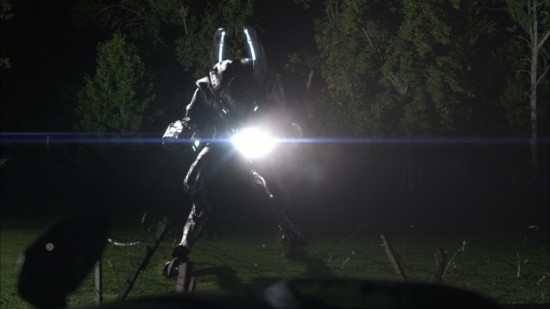By Joseph Young

International politics is a tough thing to study. We can’t necessarily treat the interactions of states like a laboratory: perform a study, tweak, replicate, and then repeat. Yet, we want to explain the world, and sometimes even predict important outcomes.
For example, what should we do if a zombie horde attacks? Dan Drezner has a plan informed by his experience as an international relations theorist.
Poliscifi, or the application of political science theories to science fiction, is more than just fun (it is fun, try it). Thought experiments have a long tradition in philosophy and allow us to overcome some of the problems associated with the difficulty of experimentation in international relations (field and laboratory experiments are gaining in prominence in the discipline, but that is for another post). After recently watching Falling Skies, Steven Spielberg’s dystopian alien invasion series [Spoiler Alert], I immediately began to poliscifi. What should we do if aliens showed up? What if they proved to be aggressive? What if we were horribly outgunned?
For those who haven’t seen it, the basic premise of Falling Skies is this: aliens show up, nuke nearly all of the world back to the Stone Age, take over, kidnap kids, and systematically kill anyone else they find. Our hero is a college professor (I’m not kidding) who studied history and applies his knowledge of insurgency and military history to the current alien crisis. While there is dissent among the survivors, our hero and his pack of humans decide on a classic guerrilla strategy. That is, make the invasion costly to the aliens in an effort to drive them out.
The beginning of the 1996 Will Smith film, Independence Day, posed a related question about how to respond to alien contact and the subsequent story has been a constant source of poliscifi. Falling Skies takes us immediately to the point of killer aliens and the best response to their aggression.
Thankfully, we have theories of how weak actors can win in war. Can they apply to aliens? Let’s find out.
Andrew Mack’s seminal 1975 World Politics essay suggests that the weak (read humans) can win wars against the strong (think Aliens). Mack’s essay is a good place to start both because of its prominence as well as applicability. Mack is writing in the shadow of one of the great defeats of a strong invader by a weak defender — the Vietnam War. There are some important similarities between the Americans dropped into the jungles of Vietnam and the aliens dropped onto the Earth in Falling Skies. Neither weak actor can target the civilians of the invader (terrorism is out), each weak actor is restricted to light weapons in a fight against a nearly unrestrained opponent (to be fair, the US never nuked the North Vietnamese, but we did consider it), and each weak party took heavy losses (admittedlyFalling Skies’ humans fare worse then the North Vietnamese did). As Mack makes clear, if capabilities were all that mattered in war, then the weak would always lose. For Mack, resolve is the trump card of the weak. When the North Vietnamese took such huge losses, they demonstrated to their stronger opponent that they would go to the mat. So the lesson for a strong invader is to choose weak actors with low resolve. How can we know this unobservable characteristic?
Game theorists suggest that the North Vietnamese revealed their type — the kind of group willing to absorb lots of deaths for their political goals. If the United States, or France for that matter, had known the Vietnamese type as a materially weak but resolute actor, this whole thing might have been avoided (probably not though).
Mack also suggests that the strong actor loses when these costs are broadcasted to the civilians of the stronger side. Since the strong party can’t lose the battles, they can only lose the political struggle. They lose the politics by losing their own civilians. So we learn from Mack that willingness to absorb the costs of war by the weaker party and creating divisions among the other side’s civilians is how to win.
The humans in Falling Skies are doing the former, but it is unclear what effect this has on the Alien’s population at home. We would have to assume there is such a population, and that since they presumably are a species bent on survival, that they would at some level be sensitive to these costs. Mack’s theory would suggest that the humans will win as long as they keep absorbing costs (read: getting killed) yet remain actively resisting and imposing costs on the Aliens—a scenario that Falling Skies seems to be roughly employing.
Ivan Arreguin-Toft offers an alternative to our conundrum that is independent of regime type and the disparity in technology. Arreguin-Toft offers an answer based on strategic interaction. In his theory, each actor’s choice set in war is boiled down to a direct or indirect strategy. Direct strategies target the other side’s military where indirect attacks target the other side’s political will. For Arreguin-Toft, similar strategies (Direct-Direct, Indirect-Indirect) by each party will lead to a strong party win. Opposite strategies will lead to the weaker party winning. The aliens began with an indirect strategy or what Arreguin-Toft calls barbarism. Kill everyone, terrify them, and crush the will to resist. At then beginning of season 2, the Aliens offered our Hero a deal to place the surviving humans in a reservation as long as the humans lay down their arms. As mentioned above, the humans are using guerrilla tactics to harass the Alien military, also an indirect strategy. Based on a quick application of Arreguin-Toft, it seems the humans would lose — an unrestrained Alien invader will eventually kill all the humans. What should the humans do? A Cold War joke about nuclear bomb drills may provide the answer, stick your head between your legs and…
Erica Chenoweth and Maria Stephan suggest that peaceful resistance can be more effective than violence, even when facing a harsh autocracy, and maybe even Aliens. In this case, however, I doubt Gandhi trumps Aliens.
This, of course, is just a thought experiment. Should it be something we really have a plan for? Or is too remote of a chance? Does this go in the same basket as nuclear terrorism? Whether the Pentagon should have such a plan has been a hot topic on far left and far right websites. While the Pentagon may or may not have plans for such a scenario, this cursory glance suggests that a guerrilla strategy is the least worst strategy. What do you think? Am I missing an important theory that might apply? What is the best response?







11 comments
In the spirit your trackback, here’s a useful link: http://bit.ly/M9CQz3
A bit of obnoxious advice in keeping with the spirit of the trackback ping: http://bit.ly/Q87uxt
I would strongly recommend reading any of Gary “The War Nerd” Brecher’s stuff regarding successful irregular war.
The British were experts at suppression of native resistance. They would would split up or manipulate the demographics (think, Tamil’s in Sri Lanka) and turn local insurrections in on themselves.
The IRA were relatively successful because of their incredible fire control, discipline, and morale. Check out Brecher’s IRA article here if you don’t mind un-PC but brutally honest military analysis:
http://exiledonline.com/wn-38-ira-vs-al-qaeda-i-was-wrong/
The War Nerd is required reading for anybody attempting to understand contemporary irregular warfare
I could go on and on and on but Brecher’s writing is better than mine.
You can also check out the old War Nerd archives at http://www.exile.ru (it’s in english)
Without falling into the Pit of Wacko Paranoia, but nonetheless skirting the Miasma of Profound What-If (from whose stench the following words arise), among some thoughtful followers of the UFO phenomenon (it’s real!) there has been concern for some years that a FALSE FLAG “alien invasion” is quite possible technically (what would Wells have done with CGI?) and, I would state, sociologically, given the general . . . state of . . . mental flacidity . . . in the general populace.
The article above dovetails with these thoughts. Who would do this to “us” (THEY are us!) and why? Pursuing those thoughts leads one to the above mentioned Pit or to other perilous (but not necessarily unfruitful) considerations.
zombie “horde”, not “hoard”. Unless it’s their treasure stash of brainzzz attacking us.
Boy, did you miss the elephant in the room! First off, a minor point: the Vietnam analogy misses the fact that the Vietnamese were heavily aided by both China and Russia. The critical point you miss on the alien invasion is that they’d never waste their time and so badly damage the environment by using minor weapons like nukes (yes, minor for them.) The super weapon they’d use(and for a race that can cross the stars, a trivial weapon to make) would be a bio-weapon that solely targets humans – game over for humanity.
@DBrown,
That makes sense to me. If we accept the idea that an alien invasion would be motivated by a desire for Earth’s resources we would expect the aliens to avoid engaging humans, which would risk human use of nuclear weapons. The radiation damage from nuclear weapons use would wreck the biosphere, which is really the only resource unique to Earth. Hanging back and waiting for a bioweapon to devastate the human population makes much more sense.